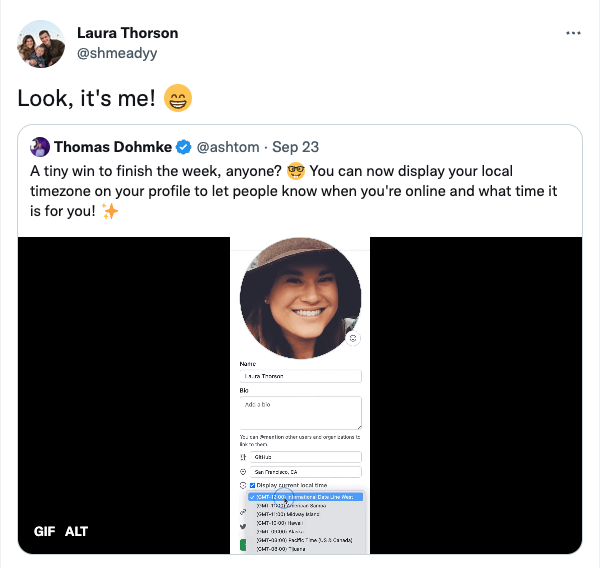Where did the learning go?
At the end of last year, I was grateful for an opportunity within GitHub to become a Product Manager. After a career in partner engineering, I had experience working really closely with VPs and Directors of Product on huge feature launches like Facebook’s Live Video API, and so the world of product fascinated me. I was grateful that there was a team at GitHub willing to take a chance on me despite having no direct product experience.
After I accepted the role, the next few weeks were a blur. I was challenged and stretched and while it’s never easy to be new at something, I also felt excited, like I could feel tangible learning taking place. My manager challenged me to really consider the specifics of certain features, the execution of the rollout and so much more. As the days turned into weeks and eventually months in the role, I felt like I was starting to get my footing and really loving this new role managing product. Three months in, I was offered more responsibility by owning our Enterprise workstream from end-to-end: identifying features to build, conceptualizing them with design, taking them to engineering, and finally writing the documentation and marketing materials, including creating the GIFs that would be posted on our CEO’s Twitter feed.
I was having fun and learning something new every day. Then, at the end of September, we heard that there was going to be a major re-org shake up within the company that impacted my team. We had served our purpose of solving highly impactful customer friction across the company’s products outside of EPD and now it was time for us to come back into the fold and be distributed across the company.
Unfortunately, there wasn’t a home for me where most of my team was going. And although I was offered limited alternatives in product, I was forewarned by potential new teammates on these teams that opportunities for mentorship and learning were going to be limited to non-existent. When I asked about other opportunities in areas of the product that I was passionate about, I was told they were looking for someone with more experience in that sector.
Something that has been weighing on me in the weeks after that decision is just how disheartening and frustrating it can be to be someone who is just starting out in this industry. A quick job search for “Product Manager” roles on LinkedIn has a number of results but when you start to drill down into the fine-print, nearly all the roles are for people with 6-8+ years of experience in Product Management for jobs that don’t even have the word ‘Senior’ attached to them. If it’s difficult for me to be qualified, with almost 10 years of technology experience including shipping features to billions of users, how much harder is it for someone else who may have the energy and drive, but doesn’t have the years of experience?
What’s most surprising is the number of companies that claim learning as one of their values.
And yet, so few job descriptions seem to reflect that value in practice. I can understand the need to have someone with a long and experienced career in product to be the one guiding the ship. If you have that 10+ year career climbing the product development ladder, you’ve certainly earned yourself the role of calling the shots, and it has to be a non-negotiable when hiring for a VP or Chief of Product. But where I think we fall short at least in this industry is prioritizing the sharing of this sort of knowledge with folks who we won’t even let in the room.
“You can’t teach what you don’t know and you can’t lead where you won’t go”
Sure, there are thousands of technology conferences every year that speak to product and what makes a good one. But if we’re continuing to knowledge share with the same folks with the same backgrounds every single year, we’ll look back 10 years from now and wonder why attendance is dwindling. I’ll even go so far as to suggest that we’re already seeing the impact of these hiring choices today. I believe one of the reasons Big Tech is experiencing decline in the most recent months after years of success is because we’ve all poached and shared the same top people from the same top companies and they’re fresh out of new ideas. Senior and director-level people from Salesforce have been poached by Google only to be poached by Stripe and applying the exact same strategies everywhere they go. There’s little to no inspiration or fresh ideas coming from these companies and earnings reports are starting to show for it.
I remember a conversation I had with my former manager at Facebook a few years ago after I had left the company, during which he told me that had I stayed, there was no way that I would have been allowed to contribute production level code to Facebook’s Live Video API like I did when I was employed there. A statement like that made sense after the Cambridge Analytica scandal, but that didn’t make it any less disappointing to hear. I had an incredible experience working at Facebook and I learned so much even as a relatively new engineer, but all of that happened because senior people I worked with were willing to take a chance on me by giving me the opportunities and the support and then letting me take off and fly.
“Those that understand, teach.”
If we aren’t willing to let folks through the pearly gates of tech companies who have less than what we deem the ideal resume, we’ll stagnate in the name of seniority and experience. Long-term success won’t be dictated by the senior leader that takes the reins and delegates the work to be done. It’ll be determined by the leaders who look down their management line and offer a hand up through increased visibility and opportunities. When senior leaders are willing to provide ‘less experienced’ people with these opportunities, it not only gives them a chance to grow, but it gives leaders the chance to grow too. Placing yourself in the uncomfortable position of teaching and mentoring requires you to better understand and synthesize that information and to reflect on if the processes you’ve been using all these years are still serving you or your users. By pulling back that veiled curtain, you’re gaining fresh and honest feedback, because that seemingly ‘naive’ question your new hire just asked could set fire to an outdated process that results in a better, more streamlined outcome.
I wouldn’t be where I am today if it wasn’t for the people I’ve met through out my career that have offered a hand up, both at Facebook and at GitHub. Due to the re-org and hiring restrictions, I’m no longer a Product Manager - but I am grateful to the people who took a chance on me last year to become one and especially to the woman who hired me to join GitHub after 2 years out of the industry when I was a mom. I believe that if we continue to look down and offer a hand up, especially to folks from underrepresented people groups, we’ll see a reinvigoration of tech with fresh and bold ideas that will actually speak to the diverse users we’re trying to develop our products for.



